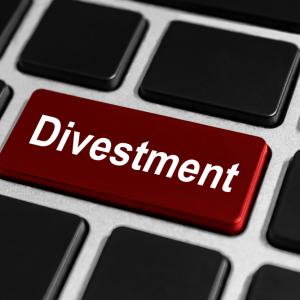

Editor's Note: In this latest edition of our “Disinvest/Reinvest” series, John Elwood reflects on how – and why – he divested from fossil fuels. You can sign up for the final week of our Christian Divestment e-course here.
Investments shape souls. Jesus tells us so.
“For where your treasure is, there your heart will be also.” Matthew 6:21
Over the years, these words of Jesus have kept me away from the “merchants of death” and conflict minerals and steered me toward ethical products of many sorts. In recent years, however, a more sinister and pervasive threat has come into focus. Climate scientists in 2014 warned that energy companies like Exxon, Shell, PetroChina and Chevron – which derive their value from enormous reserves of recoverable fossil fuels – will have to leave about 80 percent of those precious reserves in the ground if the world is to have a chance of avoiding global climate mayhem.
That means that four out of every five barrels of oil, or tons of coal, or cubic feet of natural gas that these companies have discovered and developed must eventually be written off.
The market value of fossil fuel reserves today is valued at around $27 trillion, a sum that dwarfs the famous U.S. national debt. This means that there is a very, very bad day of reckoning ahead for someone. Either all of humanity will endure unspeakable suffering, or those who invest in the fossil-fuel companies will suffer huge losses.
It became clear to me that investing in fossil fuels is no longer a retirement strategy or a way of mitigating market risks. It is a decision whether to align my soul with unfathomable harm to virtually all of humanity and to all of God’s beloved creation. If I’ve got my own personal slice of those carbon reserves (whether by buying a share of ExxonMobil or by investing in a mutual fund that does), I make money, or avoid big losses, only if the entire creation groans and suffers under the weight of climate calamity.

By now, you may have heard that Jim Wallis and Sojourners have stopped funding climate change by divesting from fossil fuels. Unfortunately, for millions of Christians who invest at faith-based financial institutions, fossil-free investing just isn’t an option.
We’ve done our research. Of the 13 major Christian investment companies we studied, not a single one offers a way for their members to opt out of fossil fuels. We think Christian investment companies should be the FIRST to stop funding climate change! Read our open letter and sign below.

We’re a few weeks into 2015, which means many of us are striving to keep our New Year’s resolutions while others have already seen their best intentions collapse under the pressure of daily routines. Every year, we make promises to be better — we’ll go to the gym, save more money, slow down. But for Christians, every day is an opportunity to make resolutions. We call that repentance.
And this year — today — I am repenting of my dependence on fossil fuels.
While many associate repentance with sorrow or guilt, the biblical meaning of the word is to stop, turn around and go in a whole new direction. Repentance means changing our course and embarking on a new path.
For Christians, humanity’s failure to care for God’s creation warrants our repentance. This is not just a theological claim but a practical moral imperative when it comes to fossil fuel consumption. American Christians need to repent — and quickly!
Our society’s addiction to fossil fuels has had an unconscionable impact on the state of our Earth and on future generations. Coal-fired power plants are giving people cancer and asthma. Oil pipelines are spilling and destroying sacred lands. Natural gas fracking waste is leaking underground, threatening water sources. Through our consumption of coal, oil, and gas, we have enabled this toxic activity.
Beyond the Letter of the Law: The Jewish Perspective on Ethical Investing and Fossil Fuel Divestment

Climate change resulting from the use of fossil fuels poses a grave threat to human and non-human life. Because a real national response to climate change has been stymied by political inaction, cultural inertia, and the concerted effort of fossil fuel companies, environmental organizations have encouraged universities, towns and cities, religious communities and other organizations to divest from fossil fuel investments.
In Judaism, ethical investing is part of traditional Jewish morality. Within the sources are two questions that are central to the issue of divestment:
Is it mandatory to divest from products (like tobacco and fossil fuel) that are not illegal but are, clearly, harmful?
To what degree is a minority shareholder morally responsible for the actions of a corporation when they are unable to exercise any significant control?
Several fundamental Jewish theological concepts bear upon these questions. Firstly, since God created the universe only God has absolute ownership over Creation (cf. 1 Chronicles. 29:10-16). Humans do not have unrestricted freedom to misuse Creation as they are tenants, not owners. Since human ownership of Creation is not absolute, the use of even private property cannot be divorced from morality. A product may be legal, but if it is harmful, its use is not ethical.

If Quaker antislavery activist John Woolman were alive today, he would probably be doing everything in his power to resist the fossil fuel industries destabilizing our climate.
Woolman, who in the mid-1700s refused to cooperate with any aspect of the slave trade, would probably divest any ownership interest he had in big oil, gas, and coal companies. To profit financially from corporations that are destroying the planet would be unconscionable.
The divestment movement received a tremendous boost the day after 400,000 people took to the streets of New York City for the People’s Climate March. In advance of the United Nations Climate Summit on Sept. 22, the Rockefeller Brothers Fund — an $860 million foundation built on the oil fortune of John D. Rockefeller — announced its commitment to divest its holdings of fossil fuels.
This was the latest wave in a series of Divest-Invest announcements including the launch of Divest-Invest Individual, which facilitates a meaningful role for individuals in the divestment and reinvestment movements. More than 700 inaugural investors – with investments totaling $2.6 billion – announced their intention to divest from fossil fuel industries and reinvest in clean, renewable energy. Hundreds of individuals have since taken the pledge to stop new investments in fossil fuels and divest from the top 200 carbon-holding companies within five years.
“The destruction of the earth’s environment is the human rights challenge of our time,” said South African Archbishop Desmond Tutu in a video-taped message to the UN Climate Summit. He called on world leaders to freeze further exploration for new fossil fuel sources. “Divest from fossil fuels and invest in a clean energy future. Move your money out of the problem and into solutions.”

Editor’s Note : This is the first post in a new series about fossil fuel divestment and clean energy reinvestment. We’ll look at how and why people of faith might choose to divest from fossil fuels as a response to climate change.
When you really care about something, it’s important not to give up hope.
If one of the things you care about is climate change and the harm we are doing to God’s beautiful world, it’s pretty hard to keep the hope alive.
After all, the world’s leading peer-reviewed scientific authority on climate change, the Intergovernmental Panel on Climate Change, just released its most damning report ever, declaring that climate disruption is at this point “irreversible.”
And then let’s look at Congress. The United States has emitted more greenhouse gases than any other country in the world, and yet it’s been five years since Congress came anywhere near passing a major climate law. (And they failed to pass that Cap & Trade law). After the most recent election last week, Sen. James Inhofe (R-OK) — who once called global warming “the greatest hoax ever perpetrated on the American people” — is set to become the gatekeeper for all climate legislation.
This should come as no surprise. Fossil fuels – the main driver of our nation’s climate culpability – are a big business. We blow up mountains to get more coal, set up dangerous oilrigs in the Gulf of Mexico, pipe tar through the breadbasket of America, and use California’s limited water supply to hydrofrack for gas. When I say “we,” I mean the fossil fuel industry. The industry spends tons of money each year propping up climate deniers, spreading misinformation, and sowing seeds of doubt about what we are doing to God’s earth. They also fund political candidates on both sides of the aisle, buying silence from elected officials whose constituents are suffering from air and water pollution, historic drought, or stronger hurricanes.
In the face of all this, I have hope — for two reasons.